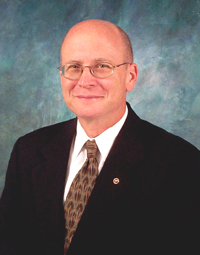 |
William Burke, M.D. |
NOTE: This profile is part of a series highlighting the 23 researchers who were named UNMC Distinguished Scientists or New Investigators for 2008. Each of these researchers will be profiled in UNMC Today leading up to a March 16 ceremony to recognize their achievements.
- Name: William Burke, M.D.
- Title: Anna O. Stake Professor of Psychiatry, vice chairman for research in the department of psychiatry
- Joined UNMC: 1984
- Hometown: Omaha
Describe your research in laymen terms.
I do clinical studies that focus on the development of new drugs for the treatment of mental disorders, primarily Alzheimer’s disease and depression.
What led you to pursue this area of research?
I became very interested in psychopharmacology as a medical student when I worked on a psychiatric inpatient unit and saw the impact that modern medication can have on severe mental illness.
How do you see your research contributing to science?
I see our work focusing on the clinical side of drug discovery — promising medications from the laboratory have to be thoroughly tested in a research setting before they can come to wide scale use. I am also interested in using existing medications in innovative ways. For example, Dr. Bill Lydiatt and I are currently studying whether antidepressants can prevent depression in patients being treated for head and neck cancer. (Click here to see an article about this research.)
Why did you become a scientist?
I began my career as a full-time clinician. The obvious need for better treatments for my patients led me to begin to conduct clinical studies and that has gradually become the focus of my daily activities.
What is your hope for the next generation of scientists?
As someone who works primarily with degenerative diseases of the brain such as Alzheimer’s disease, I hope that the next generation has a much better understanding of the fundamental mechanisms of how the brain works.
Beyond grant funding, how do you measure success?
In a couple of ways. One is practical — when a new and improved treatment becomes available to patients — that is certainly gratifying. Additionally, I am particularly interested in seeing the success of other physicians that I have mentored.
What would you tell a student interested in a research career?
Research is one of the most interesting (and potentially frustrating!) ways to spend your career. This is the era of the brain and there is no more exciting time to be alive if you are studying the central nervous system.
Do you have a hero/role model? If so, what do you admire most about this person?
I very much admired the chairman of the program where I did my residency, Dr. Sam Guze. He was one of the first psychiatrists who tried to bring the medical model to psychiatry and really made it possible to do careful clinical research in the field. In my personal life, I have always tried to live up the example that my father set for me as a person and as a father.
Tell us about your family and hobbies outside of the lab.
I have been married to the greatest woman in the world, Kate Burke, for 31 years and we have four wonderful children and two darling grandchildren. I like to bike, read, listen to music (of all sorts), and love Creighton basketball, Nebraska football and Boston Red Sox baseball.
List three things few people know about you.
- I carry numerous pictures of my grandchildren on my phone and would be happy to show you their pictures — even if you don’t ask!
- I played in a garage rock band when very young and have retained a keen interest in contemporary music that has surprised my children’s friends over the years.
- I was a philosophy major in college and always thought that one day I would be a history professor.
Click here to see the UNMC Honors Web site, which features photos of profiles of the medical center’s Distinguished Scientists and New Investigators.